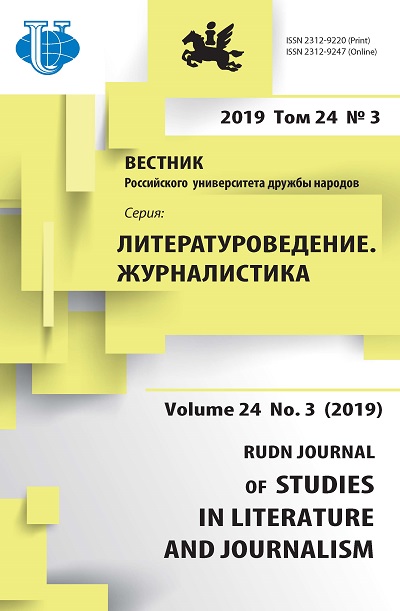Transmedia and journalistic education: parameters of interaction
- Authors: Shesterkina L.P.1, Ismailov A.Y.1
-
Affiliations:
- South Ural State University (National Research University)
- Issue: Vol 24, No 3 (2019)
- Pages: 544-553
- Section: JOURNALISM
- URL: https://journals.rudn.ru/literary-criticism/article/view/22348
- DOI: https://doi.org/10.22363/2312-9220-2019-24-3-544-553
- ID: 22348
Cite item
Full Text
Abstract
The article deals with one of the key issues of modern journalistic education associated with the formation of students' professional competencies in the context of transmedia nature of the information space. It is assumed that the educational process in this case is based on project training and has a clear focus on journalistic practice. As a complex phenomenon, it contains the basic tools of personal activity and competence approaches. The text gives an idea of such concepts as “transmedia coverage”, “professional competence” and details some aspects of the designated educational approaches. This series is supplemented by an example of participation of students of the faculty of journalism in the transmedia coverage of the international scientific event, which took place at the South Ural State University.
About the authors
Lyudmila P. Shesterkina
South Ural State University (National Research University)
Author for correspondence.
Email: shesterkinalp@susu.ru
Doctor of Philology, Dean of the Faculty of Journalism of the South Ural State University (National Research University).
76 Lenina prospekt, Chelyabinsk, 454080, Russian FederationAnvar Yu. Ismailov
South Ural State University (National Research University)
Email: ismailov@susu.ru
Ph.D. in Philosophy, Associate Professor of the Department of Journalism and Mass Communication of Faculty of Journalism of the South Ural State University (National Research University)
76 Lenina prospekt, Chelyabinsk, 454080, Russian FederationReferences
- Antipina Ye.S., Sapozhnikova O.V. Problema formirovaniya professional'noy kul'tury inostrannykh studentov-zhurnalistov [The problem of the formation of professional culture of foreign students-journalists] // Voprosy teorii i praktiki zhurnalistiki. 2017. No. 2. Pp. 179–188.
- Atlas novykh professiy 2.0 [Atlas of new professions 2.0]. Moscow, 2015. http://edu2035. org/pdf/GEF.Atlas-ru.pdf (accessed: 30.02.2019).
- Baranova Ye.A. Novyye zhurnalistskiye kompetentsii v usloviyakh mediakonvergentsii: mify i real'nost' [New journalistic competences in terms of media convergence: myths and reality] // RUDN Journal of Studies in Literature and Journalism. 2017. Vol. 22. No. 1. Pp. 177–188.
- Bolonskiy protsess: 2007–2009 gody. Mezhdu Londonom i Levenom / Luven-la-Nevom [Bologna Process: 2007–2009. Between London and Leuven] / ed. by V.I. Baydenko. Moscow: Issledovatel'skiy tsentr problem kachestva podgotovki spetsialistov Publ., 2009.
- V Kitaye pokazali pervogo virtual'nogo televedushchego [In China the first virtual presenter is showed]. 2018. https://bit.ly/2SgdXK5 (accessed: 30.02.2019).
- Drok N. Smena professional'nykh kompetentsiĭ v zhurnalistskom obrazovanii [Change of professional competences in journalism education] // Mediascope. 2011. No. 3. http:// www.mediascope.ru/node/859 (accessed: 21.01.2019).
- Kak izmenitsya PR v blizhayshiye gody: rezul'taty issledovaniya Global Communications Report [How PR will change in the coming years: the results of the study Global Communications Report] // Media Bitch. 25.04.2017. http://mediabitch.ru/pr-trends-golin/ (accessed: 19.05.2019).
- Kurbakova Ye.V. Struktura kompetentnostnogo podkhoda v zhurnalistskom obrazovanii [The structure of the competence approach in journalism education] // Vestnik Nizhegorodskogo universiteta imeni N.I. Lobachevskogo. 2014. No. 2 (2). Pp. 448–451.
- Makarova L.S. Kompetentnostno-oriyentirovannyy podkhod v sovremennom zhurnalistskom obrazovanii [Competence-oriented approach in modern journalistic education] // Vestnik Nizhegorodskogo universiteta imeni N.I. Lobachevskogo. 2014. Pp. 452–455.
- Makarova L.S. Sravnitel'nyy analiz federal'nykh gosudarstvennykh standartov (FGOS-3 i FGOS-3+) po napravleniyu “Zhurnalistika” [Comparative analysis of Federal State Standards (FSS-3 and FSS-3+) in the direction of “Journalism”] // Znak: problemnoe pole mediaobrazovaniya. 2016. No. 5. Pp. 24–29.
- Model' uchebnoy programmy po zhurnalistike: s pervoistochnikami na russkom [Model of the curriculum in journalism: with primary sources in Russian] // UNESCO Digital Library. 2009. https://bit.ly/2QwW90q (accessed: 29.02.2019).
- Model' uchebnoy programmy po zhurnalistike: sbornik novykh uchebnykh planov [Model curriculum for journalism: a collection of new curricula] // UNESCO Digital Library. 2017. https://bit.ly/2ScwG9e (accessed: 30.01.2019).
- Permyakov O.Ye., Men'kova S.V. Diagnostika formirovaniya professional'nykh kompetentsiy [Diagnostics of the formation of professional competences]. Moscow: FIRO Publ., 2010.
- Tsifrovaya industriya: sostoyaniye i perspektivy razvitiya 2018: programma konferentsii [Digital industry: state and prospects of development 2018: conference program]. https://bit.ly/2AefdGC (accessed: 18.01.2019).
- Transmedia: model' razborki [Transmedia: modelofdisassembly]. https://bit.ly/2QKDcrg (accessed: 01.02.2019).
- Universal'naya zhurnalistika: opyt proyektnogo obucheniya: uchebnoye posobiye [Universal journalism: the experience of project training: a tutorial] / ed. by L.P. Shesterkina. Chelyabinsk: Publishing centre of YUUrGU, 2018.
- Frolova T.I. Nauka, SMI, obshchestvo: kak dostich' vzaimoponimaniya. Ch. 1. Nauchnyĭ zhurnalist: missiya, zadachi i kompetentsii: metodicheskoye posobiye dlya zhurnalistov po vyyavleniyu priznakov lzhenauki [Science, media, society: how to achieve mutual understanding. Part 1. Scientific journalist: mission, tasks and competencies: methodological guide for journalists to identify signs of pseudoscience]. Moscow: Lomonosov MSU Publ., 2015. https://bit.ly/2BE7jGp (accessed: 18.01.2019).
Supplementary files















